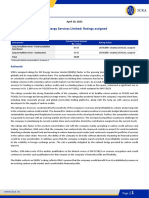Oil and Gas Benchmark Benchmark
Oil and Gas Benchmark Benchmark
Uploaded by
Maria Rozelle SixtoCopyright:
Available Formats
Oil and Gas Benchmark Benchmark
Oil and Gas Benchmark Benchmark
Uploaded by
Maria Rozelle SixtoCopyright
Available Formats
Share this document
Did you find this document useful?
Is this content inappropriate?
Copyright:
Available Formats
Oil and Gas Benchmark Benchmark
Oil and Gas Benchmark Benchmark
Uploaded by
Maria Rozelle SixtoCopyright:
Available Formats
Emirates National Oil
Company (ENOC)
Emirates National Oil Company (ENOC) is a state-owned integrated oil and gas
company headquartered in United Arab Emirates. In 2020, it had a reported 9,000
employees*. The company did not report its revenue. ENOC has subsidiaries across
the upstream, midstream and downstream sectors. There is no indication it is
planning to reduce its fossil fuel reliance and transition to low-carbon activities.
Summary
Emirates National Oil Company (ENOC) ranks joint 77th with an ACT rating of
1.0E-. Although ENOC is making steps to improve its energy efficiency and has
committed itself to contribute to the United Arab Emirates (UAE) Energy Plan
2050, which aims to reduce the country’s emissions by 70%, the company does not
have any forward-looking emissions reduction targets.
Moreover, there is no indication that the company is planning to reduce its
dependency on oil and gas or that its scope 1 and 2 and scope 1, 2 and 3 emissions
intensities will align with its 1.5°C pathway. ENOC needs to develop low-carbon
business activities rapidly if it is to transition to the low-carbon economy at the
pace required by its 1.5°C pathway.
*Employee figure as reported in 2020. This figure may include full- and part-time
employees and workers, depending on the company’s reporting practice.
RANKING POSITION TOTAL SCORE
#77/100 2.4/100
PERFORMANCE SCORE NARRATIVE SCORE
1.0/20 ABCD E
TREND SCORE
Performance module name Targets
Performance module score 0.0 /100
Rank (0-100): #38
Performance module name Material Investment
Performance module score 8.0 /100
Rank (0-100): #44
Performance module name Intangible Investment
Performance module score 0.0 /100
Rank (0-100): #20
Performance module name Sold products
Performance module score 0.0 /100
Rank (0-100): #55
Performance module name Management
Performance module score 24.7 /100
Rank (0-100): #68
Performance module name Supplier Engagement
Performance module score 0.0 /100
Rank (0-100): #57
Performance module name Client Engagement
Performance module score 5.0 /100
Rank (0-100): #39
Performance module name Policy Engagement
Performance module score 10.0 /100
Rank (0-100): #69
Performance module name Business Model
Performance module score 5.0 /100
Rank (0-100): #37
Leading practices
No leading practices were identified for this company.
Risks and opportunities
Targets
ENOC has only disclosed one target: to reduce scope 1 and 2 emissions by just 1%
in 2019. Without forward-looking targets for reducing its scope 1 and 2 and its
scope 1, 2 and 3 emissions, the level of ENOC’s climate ambition could not be
assessed. To demonstrate commitment to the low-carbon transition, ENOC should
endeavour to set intermediate and long-term targets aligned with its 1.5°C
pathway.
Low-carbon and mitigation technology CapEx
In 2018, ENOC invested USD 1.6 million in energy and resource management.
However, the company does not disclose its total capital expenditure (CapEx),
meaning that the proportion of the company’s CapEx designated to low-carbon
technologies could not be assessed. The company can improve its disclosure by
reporting its forecasted future CapEx for low-carbon and mitigation technologies.
Further, the company should strive to direct 77% of its CapEx to low-carbon
technologies under the 1.5°C scenario.
Trend
ENOC receives a trend score of -. If the company were reassessed in the near
future, its score would likely decrease. ENOC only had one emissions reduction
target, which was to reduce its scope 1 and 2 emissions intensity by just 1% in 2019.
There is no evidence that the company has plans to significantly transition its
business model towards low-carbon activities.
Progress towards the Paris
Agreement
Commitment
ENOC has committed that it will contribute to the UAE Energy Plan 2050, which
aims to reduce the country’s emissions by 70%. However, it has set only one
concrete emissions reduction target so far, to have reduced scope 1 and 2
emissions intensity by 1% in 2019.
Transition plan
ENOC does not have a detailed long-term transition plan. It has an energy and
research management programme that focuses on improving energy efficiency in
the company’s operations.
Present
ENOC has started integrating solar energy into its operations and planned to install
44 electric vehicle chargers at its service stations in the UAE in 2020. It is also
setting up KPI targets for its upstream subsidiary Dragon Oil. However, there is no
evidence that the company plans to reduce dependency on oil and gas.
Legacy
In 2017, ENOC launched ‘Biodiesel 5’, a fuel containing 95% ordinary diesel and 5%
biodiesel made from used cooking oil. However, between 2014 and 2019, the
company’s total upstream production increased and there was no evidence that its
scope 1, 2 and 3 emissions intensity decreased.
Consistency
ENOC’s lack of a long-term transition plan suggests that the company will continue
to be dependent on fossil fuels in the future. There is no evidence that the
company has plans to deploy large-scale low-carbon business activities.
More about the company
Headquarters Group revenue
Dubai, United Arab Emirates Not available
Ownership structure Number of employees
State owned 9,000
Scope of activity Website
Fully integrated https://www.enoc.com/en/
You might also like
- Module5 UberDocument7 pagesModule5 UberYatindra Prakash SinghNo ratings yet
- Finance Case 2 CompletedDocument5 pagesFinance Case 2 CompletedAhmedMalik100% (1)
- Midland Energy ReportDocument13 pagesMidland Energy Reportkiller dramaNo ratings yet
- Battery Swaping Brief Sun MobilityDocument3 pagesBattery Swaping Brief Sun MobilityRohit KumarNo ratings yet
- Shapiro CapBgt IMDocument76 pagesShapiro CapBgt IMjhouvanNo ratings yet
- Group 2 Mahindra - GenZe - Marketing - Plan PDFDocument24 pagesGroup 2 Mahindra - GenZe - Marketing - Plan PDFAnanditaKarNo ratings yet
- R. Krishnan - Electric Motor Drives Modeling, Analysis, and ControlDocument653 pagesR. Krishnan - Electric Motor Drives Modeling, Analysis, and ControlCassandra Bordeanu94% (32)
- FM ProjectDocument10 pagesFM ProjectriyapantNo ratings yet
- Eicher Motors Ltd.Document11 pagesEicher Motors Ltd.ANNA VARUGHESE 2128034No ratings yet
- Reliance Industries Fundamental PDFDocument6 pagesReliance Industries Fundamental PDFsantosh kumariNo ratings yet
- PICORPDocument10 pagesPICORPHananin NasirNo ratings yet
- 82 - Amber ReportDocument5 pages82 - Amber ReportSaloniPatilNo ratings yet
- Fertiglobe AR2023 E VF.3Document225 pagesFertiglobe AR2023 E VF.3rgnofearNo ratings yet
- Cem em Casestudy Adnoconshore UaeDocument8 pagesCem em Casestudy Adnoconshore UaemuralisunNo ratings yet
- DellDocument18 pagesDellMariammah SethambaramNo ratings yet
- Cost Management Hero MotoCorpDocument6 pagesCost Management Hero MotoCorpNiraj AgarwalNo ratings yet
- EIL Annual Report 2019-20 Shareholder Eng PDFDocument308 pagesEIL Annual Report 2019-20 Shareholder Eng PDFgauravkrastogiNo ratings yet
- Chapter 2 - Tutorial SetDocument6 pagesChapter 2 - Tutorial SetAngel Pria David LunchaNo ratings yet
- Iktva 2021 - V2Document40 pagesIktva 2021 - V2Hassan Al Eid100% (1)
- Incremental AnalysisDocument25 pagesIncremental AnalysisDejene HailuNo ratings yet
- AsdasdasdasdDocument20 pagesAsdasdasdasdbgNo ratings yet
- 02Document20 pages02bgNo ratings yet
- Perfomance6 15Document2 pagesPerfomance6 15George BulikiNo ratings yet
- SBM Annual Report 2021Document268 pagesSBM Annual Report 2021sacaldasNo ratings yet
- Incremental AnalysisDocument25 pagesIncremental AnalysisMobin NasimNo ratings yet
- 2021 Annual Report Borg WarnerDocument149 pages2021 Annual Report Borg WarnersriramNo ratings yet
- Ingevity Annual Report 2023 Final 03122024Document128 pagesIngevity Annual Report 2023 Final 03122024Rajat ZopeNo ratings yet
- PM EdcDocument10 pagesPM EdcAlbee Koh Jia YeeNo ratings yet
- SAR-MAR-210422-1227PM - RR - 034-COPY 1.editedDocument12 pagesSAR-MAR-210422-1227PM - RR - 034-COPY 1.editedJishnu ChaudhuriNo ratings yet
- Finance ProjectDocument16 pagesFinance ProjectShashank kumar tripathiNo ratings yet
- Asdasdwqdas: Da SDDocument13 pagesAsdasdwqdas: Da SDbgNo ratings yet
- Faculty - Accountancy - 2024 - Session 1 - Degree - Maf651Document6 pagesFaculty - Accountancy - 2024 - Session 1 - Degree - Maf651FARIDAH ABU HASIHNo ratings yet
- ObjectivesDocument19 pagesObjectivesbgNo ratings yet
- CFAP 3 Winter 2022Document8 pagesCFAP 3 Winter 2022Khan IdreesNo ratings yet
- EKI Energy Services LimitedDocument8 pagesEKI Energy Services LimitedTarun 199No ratings yet
- Accounting and FinanceDocument13 pagesAccounting and Financekanishka katariaNo ratings yet
- Abb Case StudyDocument16 pagesAbb Case Studyelfe0% (1)
- 05Document6 pages05bgNo ratings yet
- An Organisation Study At": Internship Report ON by Prajwal A S Submitted ToDocument18 pagesAn Organisation Study At": Internship Report ON by Prajwal A S Submitted ToPRAJWAL A SNo ratings yet
- RR PLC Holdings 2023 Full Year Results Press ReleaseDocument54 pagesRR PLC Holdings 2023 Full Year Results Press Releaseabhishekverma3733No ratings yet
- Carbon Finance - Implications For Long-Term Financing of Clean Energy SolutionsDocument10 pagesCarbon Finance - Implications For Long-Term Financing of Clean Energy Solutionsnienke_stam100% (2)
- Sona Koyo Steering Systems Limited (SKSSL) Vendor ManagementDocument21 pagesSona Koyo Steering Systems Limited (SKSSL) Vendor ManagementSiddharth UpadhyayNo ratings yet
- Tutorial 5 FAT Solution (Unimelb)Document25 pagesTutorial 5 FAT Solution (Unimelb)Ahmad FarisNo ratings yet
- PPN0621 Carbon Reduction Plan - BAE Systems PLC March 2023 FINALDocument6 pagesPPN0621 Carbon Reduction Plan - BAE Systems PLC March 2023 FINALRaedNo ratings yet
- MethodologyDocument6 pagesMethodologybgNo ratings yet
- Press Results - 2023 ResultsDocument25 pagesPress Results - 2023 ResultsramNo ratings yet
- 2021-investor-conference-presentation-en-us-7363258Document124 pages2021-investor-conference-presentation-en-us-7363258heri rustamajiNo ratings yet
- AsadsdasdasdDocument6 pagesAsadsdasdasdbgNo ratings yet
- Financial Analysis of Indigo Airlines From Lender's PerspectiveDocument12 pagesFinancial Analysis of Indigo Airlines From Lender's PerspectiveAnil Kumar Reddy100% (1)
- Revison Lecture - Q1 Q2Document28 pagesRevison Lecture - Q1 Q2pes60804No ratings yet
- Final Ratio AnalysisDocument40 pagesFinal Ratio AnalysisShruti PatilNo ratings yet
- Financial Statement Analysis - Marks & SpencerDocument8 pagesFinancial Statement Analysis - Marks & Spencermuhammad.salmankhanofficial01No ratings yet
- Raymond Limited Textile Division, Chhindwara (Madhya Pradesh)Document7 pagesRaymond Limited Textile Division, Chhindwara (Madhya Pradesh)vikas_rathour01No ratings yet
- Design For The Environment: Figure 2: Future Goals For Fy2008 and BeyondDocument4 pagesDesign For The Environment: Figure 2: Future Goals For Fy2008 and BeyondsinghjattNo ratings yet
- Financial Decision Making QP April 2021Document4 pagesFinancial Decision Making QP April 2021Nihar ShahNo ratings yet
- ISO 50001 ToyotaDocument21 pagesISO 50001 Toyotaarpitrathore466No ratings yet
- Management Control Systems: Prof Swapna TamhankarDocument21 pagesManagement Control Systems: Prof Swapna TamhankarGirish DemblaNo ratings yet
- VILAS 12112024101403 Vilas Transcore Investor Presentation H1FY25 V4Document34 pagesVILAS 12112024101403 Vilas Transcore Investor Presentation H1FY25 V4Hi OrgNo ratings yet
- Antony WasteDocument7 pagesAntony WastemiddlecricketwarriorsNo ratings yet
- Policies to Support the Development of Indonesia’s Manufacturing Sector during 2020–2024: A Joint ADB–BAPPENAS ReportFrom EverandPolicies to Support the Development of Indonesia’s Manufacturing Sector during 2020–2024: A Joint ADB–BAPPENAS ReportNo ratings yet
- List of the Most Important Financial Ratios: Formulas and Calculation Examples Defined for Different Types of Key Financial RatiosFrom EverandList of the Most Important Financial Ratios: Formulas and Calculation Examples Defined for Different Types of Key Financial RatiosNo ratings yet
- Technical and Vocational Education and Training in the Philippines in the Age of Industry 4.0From EverandTechnical and Vocational Education and Training in the Philippines in the Age of Industry 4.0No ratings yet
- ABL Sustainability Report 2021Document14 pagesABL Sustainability Report 2021Stroller ShowNo ratings yet
- Energy From Waste Plants With Carbon Capture FinalDocument34 pagesEnergy From Waste Plants With Carbon Capture FinalJonson CaoNo ratings yet
- Sustainablilty Report 15 16Document110 pagesSustainablilty Report 15 16wuguohaoNo ratings yet
- Case Study - TFL FinalDocument3 pagesCase Study - TFL FinalDriss El HadaouiNo ratings yet
- CFP Histories of FlexibilityDocument2 pagesCFP Histories of FlexibilityPeter FormanNo ratings yet
- East London Energy Decarbonisation Report 2022Document21 pagesEast London Energy Decarbonisation Report 2022sandbenchNo ratings yet
- Energy Policy: Anne Held, Mario Ragwitz, Frank Sensfuß, Gustav Resch, Luis Olmos, Andrés Ramos, Michel RivierDocument15 pagesEnergy Policy: Anne Held, Mario Ragwitz, Frank Sensfuß, Gustav Resch, Luis Olmos, Andrés Ramos, Michel RivierDimitris HatzidimosNo ratings yet
- Alfred Horie Construction CLTNorwichAcademyandOtherEuropeanProjectsDocument57 pagesAlfred Horie Construction CLTNorwichAcademyandOtherEuropeanProjectsvasheena mittalNo ratings yet
- Application To Scottish Government Malawi Development Programmes Funding Round 2018Document28 pagesApplication To Scottish Government Malawi Development Programmes Funding Round 2018John TauloNo ratings yet
- Using Carbon Dioxide To Generate ElectricityDocument25 pagesUsing Carbon Dioxide To Generate ElectricityCOREi5No ratings yet
- Lesson 1 - Climate Change PhenomenonDocument20 pagesLesson 1 - Climate Change PhenomenonJBNo ratings yet
- Xcarb Flatproducts BrochureDocument12 pagesXcarb Flatproducts BrochureHossin ZianiNo ratings yet
- Eligible Electric Vehicle Charging StationsDocument2 pagesEligible Electric Vehicle Charging Stationsiran1412690No ratings yet
- ECO Canada BrochureDocument36 pagesECO Canada BrochurevdxgzdfergsdvxdfasNo ratings yet
- Low Carbon TransitionsDocument17 pagesLow Carbon TransitionsAoun MuhammadNo ratings yet
- (Sujun Kim) Final NationalSeminar ID Battery Industry Deloitte VF2Document24 pages(Sujun Kim) Final NationalSeminar ID Battery Industry Deloitte VF2hilmi septabiyyaNo ratings yet
- LEED v4.1 Cities and Communities Existing: Getting Started Guide For Beta Participants April 2021Document110 pagesLEED v4.1 Cities and Communities Existing: Getting Started Guide For Beta Participants April 2021Santiago CardonaNo ratings yet
- Space Syntax - Beijing CBD Case StudyDocument8 pagesSpace Syntax - Beijing CBD Case StudySpace Syntax Limited100% (1)
- CPLC+ NetZero ReportDocument60 pagesCPLC+ NetZero Reportion dogeanuNo ratings yet
- Analysis of Electric Vehicle Trends, Development and Policies in IndiaDocument2 pagesAnalysis of Electric Vehicle Trends, Development and Policies in Indiass1976No ratings yet
- Apple Environmental Responsibility Report 2019Document87 pagesApple Environmental Responsibility Report 2019Jack Purcher100% (1)
- Trade and Environment Review 2009-2010Document230 pagesTrade and Environment Review 2009-2010Carlos PaniaguaNo ratings yet
- Design For Sustainable Architecture and EnvironmenDocument17 pagesDesign For Sustainable Architecture and EnvironmenParnian SalehiNo ratings yet
- IR Presentation 19 Aug - FinalDocument28 pagesIR Presentation 19 Aug - FinalVipin SomasekharanNo ratings yet
- The Top 10 Risks For Oil and GasDocument24 pagesThe Top 10 Risks For Oil and GasMsm MannNo ratings yet
- KEF LATAC 2023 - 16th MarchDocument76 pagesKEF LATAC 2023 - 16th MarchMunguntsetseg GanboldNo ratings yet
- Hidrogenio Verde-ENGDocument14 pagesHidrogenio Verde-ENGwernecksantos2952No ratings yet

























































































